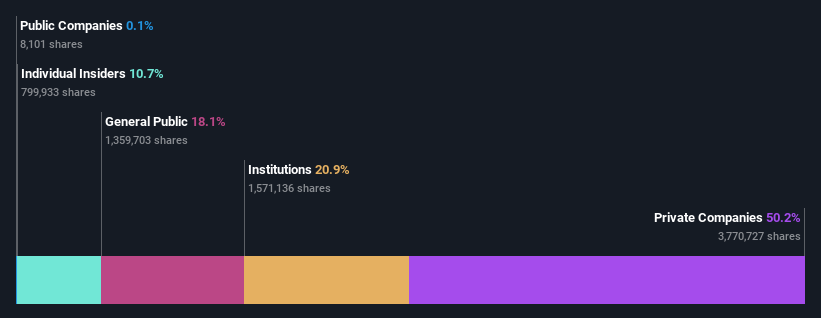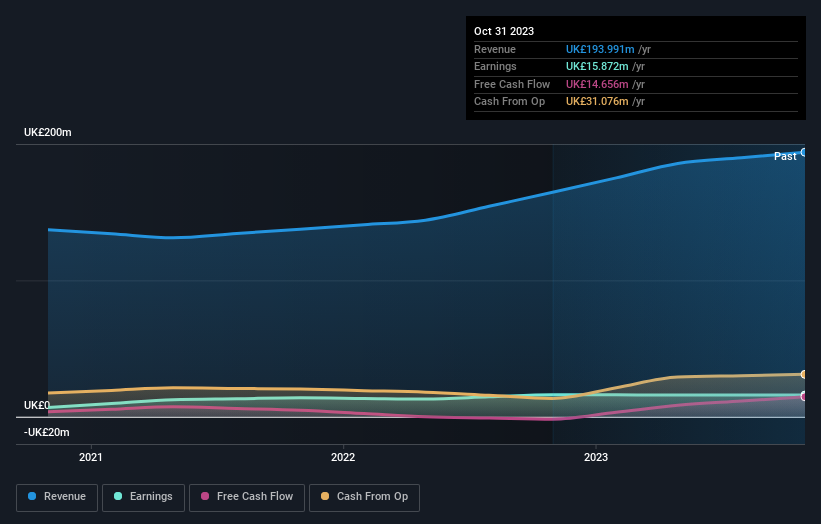Private companies who have a significant stake must be disappointed along with institutions after Goodwin PLC's (LON:GDWN) market cap dropped by UK£45m
Key Insights
The considerable ownership by private companies in Goodwin indicates that they collectively have a greater say in management and business strategy
J. M.Securities Limited owns 50% of the company
To get a sense of who is truly in control of Goodwin PLC (LON:GDWN), it is important to understand the ownership structure of the business. We can see that private companies own the lion's share in the company with 50% ownership. In other words, the group stands to gain the most (or lose the most) from their investment into the company.
While institutions who own 21% came under pressure after market cap dropped to UK£458m last week,private companies took the most losses.
In the chart below, we zoom in on the different ownership groups of Goodwin.
Check out our latest analysis for Goodwin
What Does The Institutional Ownership Tell Us About Goodwin?
Institutions typically measure themselves against a benchmark when reporting to their own investors, so they often become more enthusiastic about a stock once it's included in a major index. We would expect most companies to have some institutions on the register, especially if they are growing.
We can see that Goodwin does have institutional investors; and they hold a good portion of the company's stock. This suggests some credibility amongst professional investors. But we can't rely on that fact alone since institutions make bad investments sometimes, just like everyone does. If multiple institutions change their view on a stock at the same time, you could see the share price drop fast. It's therefore worth looking at Goodwin's earnings history below. Of course, the future is what really matters.
Goodwin is not owned by hedge funds. Our data shows that J. M.Securities Limited is the largest shareholder with 50% of shares outstanding. This essentially means that they have extensive influence, if not outright control, over the future of the corporation. With 8.3% and 6.7% of the shares outstanding respectively, James Sharp & Co., Asset Management Arm and John Ridley are the second and third largest shareholders.
While studying institutional ownership for a company can add value to your research, it is also a good practice to research analyst recommendations to get a deeper understand of a stock's expected performance. Our information suggests that there isn't any analyst coverage of the stock, so it is probably little known.
Insider Ownership Of Goodwin
The definition of company insiders can be subjective and does vary between jurisdictions. Our data reflects individual insiders, capturing board members at the very least. Management ultimately answers to the board. However, it is not uncommon for managers to be executive board members, especially if they are a founder or the CEO.
Insider ownership is positive when it signals leadership are thinking like the true owners of the company. However, high insider ownership can also give immense power to a small group within the company. This can be negative in some circumstances.
Our most recent data indicates that insiders own a reasonable proportion of Goodwin PLC. Insiders own UK£49m worth of shares in the UK£458m company. This may suggest that the founders still own a lot of shares. You can click here to see if they have been buying or selling.
General Public Ownership
The general public-- including retail investors -- own 18% stake in the company, and hence can't easily be ignored. This size of ownership, while considerable, may not be enough to change company policy if the decision is not in sync with other large shareholders.
Private Company Ownership
Our data indicates that Private Companies hold 50%, of the company's shares. Private companies may be related parties. Sometimes insiders have an interest in a public company through a holding in a private company, rather than in their own capacity as an individual. While it's hard to draw any broad stroke conclusions, it is worth noting as an area for further research.
Next Steps:
I find it very interesting to look at who exactly owns a company. But to truly gain insight, we need to consider other information, too.
I like to dive deeper into how a company has performed in the past. You can access this interactive graph of past earnings, revenue and cash flow, for free.
Of course, you might find a fantastic investment by looking elsewhere. So take a peek at this free list of interesting companies.
NB: Figures in this article are calculated using data from the last twelve months, which refer to the 12-month period ending on the last date of the month the financial statement is dated. This may not be consistent with full year annual report figures.
Have feedback on this article? Concerned about the content? Get in touch with us directly. Alternatively, email editorial-team (at) simplywallst.com.
This article by Simply Wall St is general in nature. We provide commentary based on historical data and analyst forecasts only using an unbiased methodology and our articles are not intended to be financial advice. It does not constitute a recommendation to buy or sell any stock, and does not take account of your objectives, or your financial situation. We aim to bring you long-term focused analysis driven by fundamental data. Note that our analysis may not factor in the latest price-sensitive company announcements or qualitative material. Simply Wall St has no position in any stocks mentioned.

 Yahoo Finance
Yahoo Finance 

